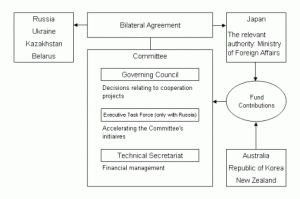(1) In accordance with the bilateral agreements between Japan and each of the four FSU countries, the following Committees were established:
- the Committee on Cooperation to Assist the Destruction of Nuclear Weapons Reduced in the Russian Federation (Japan-Russia Committee)
- the Committee on Cooperation for the Elimination of Nuclear Weapons Reduced in Ukraine (Japan-Ukraine Committee)(closed on July 15, 2018)
- the Committee on Cooperation for the Destruction of Nuclear Weapons Reduced in the Republic of Kazakhstan (Japan-Kazakhstan Committee)
- the Committee on Cooperation for the Non-Proliferation of Nuclear Weapons (Japan-Belarus Committee) (closed on January 24, 2015)
(2) Each Committee is composed of a Governing Council and a Technical Secretariat. Only the Japan-Russia Committee has an Executive Task Force (see (4) below)
(3) Each Governing Council is composed of representatives from Japan and the corresponding country. The Japanese side is represented by its ambassador to the country, and his counterpart is from the relevant ministry of the corresponding country. The Governing Council decides the priority of cooperation projects and the implementation of specific programs.
The representatives as of May, 2016 are as follows:
(a) Japan-Russia Committee
(b) Japan-Kazakhstan Committee
| Ambassador Extraordinary and Plenipotentiary of Japan to the Republic of Kazakhstan | Tatsuhiko KASAI | |
| Vice-Minister of Energy, Republic of Kazakhstan | Bakhytzhan JAXALIYEV |
(4) In February 2003, the Governing Council of the Japan-Russia Committee decided to establish the Executive Task Force as a subsidiary body of the Governing Council in order to accelerate implementation of projects. The Executive Task Force is composed of a Coordinator, a Deputy Coordinator and other members from both Japan and Russia.
As of November, 2019, the Coordinators from Japan and Russia are as follows:
(5) Each bilateral agreement stipulates the establishment of a Technical Secretariat. The Technical Secretariat on Cooperation for the Elimination of Nuclear Weapons Reduced in the Former Soviet Union (general name) was established on January 10, 1994 as a body having the combined functions of the Technical Secretariat for the four Committees. The Technical Secretariat manages administrative work on the Committees’ funds, etc., as per the instructions of the Governing Council.
As of April, 2021, the Technical Secretariat is headed by:
| Secretary-General | Tsutomu ARAI |
(6) The following chart shows the cooperation mechanism, including the structure of each Committee and relationships between Japan and its counterpart. The Japanese relevant authorities responsible for each bilateral Agreement are the Ministry of Foreign Affairs (Arms Control and Disarmament Division, Disarmament, Non-Proliferation and Science Department).
* The financial contribution from Australia, Republic of Korea and New Zealand were utilized for the nuclear submarine dismantlement projects in Russia.
